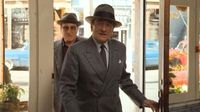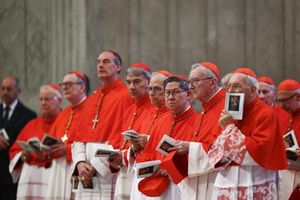Robert De Niro makes a grand return to the silver screen in his latest film, The Alto Knights, a biographical drama that hits theaters on March 21, 2025. Dual roles see the seasoned actor embody two notorious mob leaders—Frank Costello and Vito Genovese—in a gripping tale of power and betrayal. Written by Nicholas Pileggi, the mind behind the acclaimed Goodfellas, and directed by Barry Levinson, this film is set to be a major event for audiences fond of classic gangster sagas.
In The Alto Knights, De Niro's characters vie for supremacy over New York's criminal landscape, highlighting their turbulent friendship and the ensuing fallout that reshapes the Mafia forever. The movie promises both nostalgia for old-school storytelling and cutting-edge technology, allowing De Niro to interact with his younger self, a feature reminiscent of classic cinematic techniques yet invigorated by modern effects.
The film's release comes in a competitive landscape, going head-to-head with Disney’s live-action remake of Snow White. Yet, reviewers are optimistic about The Alto Knights due to its rich narrative and stellar performances. As Director Levinson commented, this project arose from a unique partnership forged between Pileggi and Warner Bros. Discovery CEO David Zaslav, granting the film a promising start in its promotional journey.
Inside the creative process, Levinson noted how the idea expanded from focusing solely on Frank Costello to crafting a dual role for De Niro. The interaction between Costello and Genovese offers a deep dive into the nuances of organized crime, capturing the volatile and the calculated aspects of these larger-than-life figures. “Originally, it was a Frank Costello piece, but we developed two characters,” he explained. This evolution emphasizes the transactional pressures and emotional entanglements inherent in mob life.
It’s not merely another mob movie; it taps into the psyche of the American dream and the varied characters trying to navigate it, a theme Levinson has always been passionate about exploring. He stated: “I am always drawn to character, first and foremost.” This brings a focus on the psychological complexity behind De Niro’s characters, showcasing their depths beyond violent outbursts and criminal enterprises.
For De Niro, portraying both roles represents a significant challenge. “Bob liked the challenge of doing two totally different characters,” Levinson described, illustrating the actor's dedication to his craft. As rehearsals unfolded, the team worked tirelessly on fine-tuning dialogues between the characters, contributing to the authenticity of their interactions. “In his camper at lunchtime, we would go over and tweak the lines,” Levinson added, making it clear that De Niro's commitment to character development is a hallmark of his performances.
Levinson's collaboration with De Niro isn't new; they've paired up on several projects over the years, understanding the intricacies of working with such a dedicated and talented actor. “We’re talking about one of the great actors with a real challenge,” said Levinson, noting the distinct personalities of Genovese—the more aggressive aspect—and Costello, who adopts a more corporate mafioso persona.
The relationship between character and storytelling lies at the heart of Levinson’s cinematic endeavors. Reflecting on his earlier work, he recalls sentimentality crafted through ordinary exchanges that convey profound emotionality. “What do you want to do tonight, Marty?” reflects the essence of his storytelling principles, a line that remains rooted in relatability and depth.
The setting of The Alto Knights serves as a contrasting backdrop—a historical portrayal of mobsters vying for control during a transformed America. Levinson has taken inspiration from the past, crafting narratives that resonate today while drawing on the historical significance of their characters’ actions. With The Alto Knights, the audience is expected to reflect on the complex interplay of relationships that define both personal ambition and collective identity within organized crime.
In addition, the film shines a light on how loyalty, betrayal, and ambition intertwine in the fabric of American society. De Niro’s dual portrayal urges viewers to confront the morally gray areas of crime, challenging them to assess the thin line between hero and villain. As Levinson noted, “We talked about it, discussed it, refined it,” ensuring the film's depth resonates with audiences searching for more than just traditional mobster tales.
The Alto Knights is not just a film. It’s an exploration of character and narrative, seeking to redefine what it means to be a part of the American dream. Levinson’s return to the mob genre alongside De Niro, combined with Pileggi's intricate storytelling, promises to deliver a captivating experience for viewers craving storytelling that goes beyond the superficial thrill of crime.
As moviegoers gear up for the film's release, there’s a palpable sense of excitement. Critics are already pointing to De Niro's remarkable transformation in embodying two contrasting role states as a potential highlight of his distinguished career. As audiences step into theaters, they can anticipate not only an engaging narrative but a reflection on the characters that have shaped America’s cinematic landscape.






